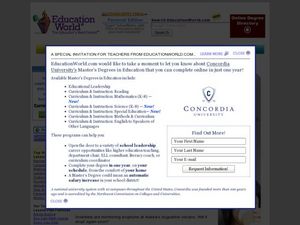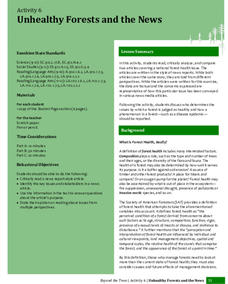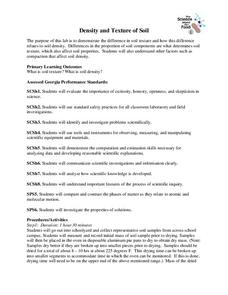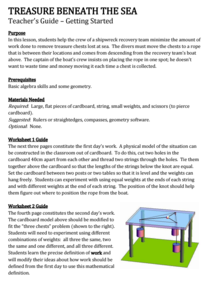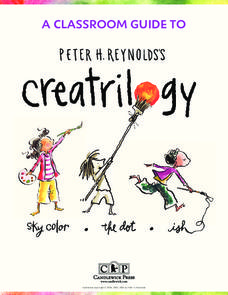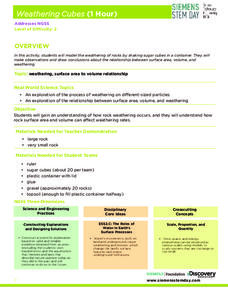Teach Engineering
Cosmic Rhythm
Young engineers turn poets with a hands-on activity that challenges them to apply the concept of rhythm to crafting a poem.
Curated OER
Scientists Use Web Site to Report Volcano Activity
Students react to statements about volcanoes, then read a news article about scientists monitoring eruptions at Augustine volcano in Alaska. In this earth science and current events lesson, the teacher introduces the lesson with a...
SRI International
Nanofiltration
How can everyone in the world have access to clean drinking water? Throughout the lesson, learners read about and listen to how water is filtered, what the filtration process removes, and the best ways to filter. They explore the...
Berkshire Museum
Where’s the Water?: Acting Out Science Cycles
Young scientists transform themselves into rivers, oceans, clouds, and drops of water in order to explore the water cycle. After assigning and explaining to students their different roles in the activity, the teacher reads aloud a...
Core Knowledge Foundation
The Human Body—Building Blocks and Nutrition Tell It Again!™ Read-Aloud Anthology
A read-aloud anthology explores the human body. Over three weeks, second graders listen to and discuss texts related to the cells, tissue, organs, digestive system, excretory system, nutrients, and a balanced diet. Learners practice word...
Core Knowledge Foundation
Classification of Animals Tell It Again!™ Read-Aloud Anthology
Animal classification is the theme of a three-week read-aloud anthology. Scholars listen to and discuss a reading and complete extension activities throughout nine lessons. Writing opportunities delve deep into the process of writing an...
Core Knowledge Foundation
The Human Body—Systems and Senses Tell It Again!™ Read-Aloud Anthology
Nine lessons over three weeks explore the human body through read-alouds. Third graders listen to and discuss a reading followed by extension activities, including word work and comprehension practice. Learners draft a narrative essay.
Core Knowledge Foundation
Light and Sound Tell It Again!™ Read-Aloud Anthology
Light and sound are the running themes of a read-aloud anthology. Over three weeks, third graders listen to discuss readings in preparation for completing extension activities. Pupils work through the writing process to compose an...
Cornell University
Classification
Explore the scientific method of classification. An interactive activity asks learners to create a classification system for a group of objects and develop a flow chart to communicate their systems. In addition, individuals use a...
Cornell University
Friction
Friction and gravity are always at odds! Learners complete a set of activities to explore the relationship between friction and gravity. Groups make conclusions about the factors that affect the amount and type of friction between surfaces.
Baylor College
They're Everywhere: Bacteria
Totally gross out your class with the eighth lesson plan in this series on food science. Explore the microscopic world of bacteria by taking swabs of different classroom objects and growing colonies in petri dishes. An engaging activity...
Baylor College
Using Food Labels
Help your class make sense of nutrition labels with the ninth lesson of this series. After explaining the different information provided on packaged food labels, perform an activity that demonstrates the amount of sugar in a single can...
University of Florida
Unhealthy Forests and the News
Everyone knows a tree makes a sound when it falls, but what do we know about dying trees? Class members learn background information about Laurel wilt disease from a teacher-led presentation. Team members work with partners to read and...
Baylor College
What's Is Soil Made Of?
It's time to roll up those sleeves and get a little dirty in the second lesson plan of this series on the science of food. Investigate where plants and animals get the minerals they need to live in this two-part exploration of soil....
University of Georgia
Density and Texture of Soil
All soil is not created equal! A lab activity asks learners to collect and analyze soil. Specific calculations determine the amount of sand, silt, and clay in a sample and allow individuals to identify the soil texture.
Alliance Theater
The Jungle Book Post-Show STEAM Lesson
An ecosystem is really just the flow of energy through many different living organisms. A study of Rudyard Kipling's The Jungle Book leads to an environmental science activity in which learners study how various factors can affect...
Curated OER
Earth's Heavenly Treasures: Hummingbirds
Young ornithologists watch an informative video and use the Internet to gather data about the life, size, habitat, and migration of hummingbirds. The interdisciplinary lesson includes activities that target art, science, math, and...
California Mathematics Project
Treasure Beneath the Sea
Explore the geometry of treasure hunting! Learners use geometry to design a treasure recovery strategy. The objective is to create a design that minimizes the amount of work required. Budding mathematicians use properties of triangles as...
Energy for Keeps
Renewable Energy Action Project: What's in Your Energy Portfolio?
Uncover the renewable energy potential in your region. The activity outlines an approach to research current practices and trends. Learners conduct surveys to assess the attitudes of the local population and prepare a paper summarizing...
Candlewick Press
A Classroom Guide to Peter H. Reynolds's Creatrilogy
Help young readers find, identify, and use their voices with a set of empowering activities based on Peter H. Reynolds' trilogy of books. Sky Color, Ish, and The Dot focus on recognizing moods and treating each other kindly, and their...
Curated OER
Just Look at Our Shoes
Students complete cross-curricular activities using a shoe theme. In this cross-curricular lesson, students explore various systems, examine open and closed systems, and examine product life cycles.
Curated OER
Ice Cream
Open this instructional activity by giving a brief history of ice cream. Using liquid nitrogen to lower the temperature, preteens make their own confection. The accompanying activity sheet queries learners about freezing point, the...
Center Science Education
CO2: How Much Do You Spew?
Split your earth science or environmental studies class into groups and give each a scenario card. Scenario cards describe the lifestyles of 10 different fictitious families, focusing on their energy usage. Carbon dioxide emissions are...
Discovery Education
Weathering Cubes
Weathering is not necessarily a result of the weather. Scholars conduct an experiment to explore the effect of surface area and volume on the weathering process. They create their own sugar cube rocks using the same number of cubes—but...



